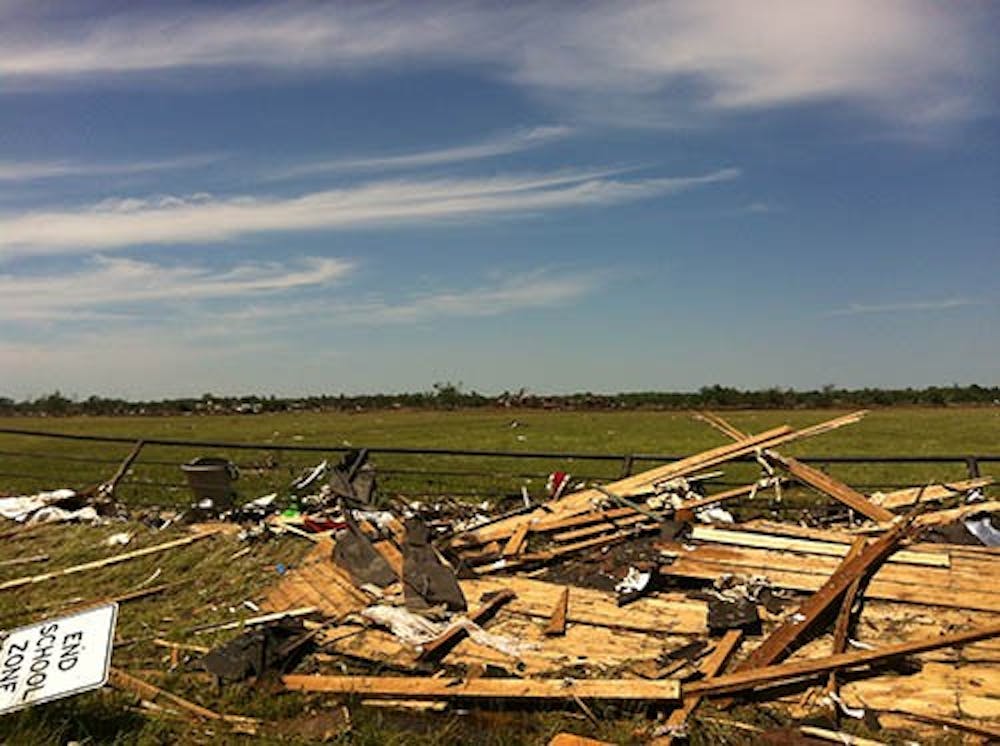Brooklyn Schumacher only had three minutes to collect her favorite jewelry, a raincoat and her laptop before finding safety in her neighbor’s storm shelter.
All the time in the world couldn’t have prepared the junior Ball State gymnast for the 20 minutes she spent in the shelter, wondering what would be left above.
“The tornado itself was so loud you couldn’t even hear the hail,” Schumacher said. “You couldn’t hear anything else; it was like a train riding right over it.”
She said it wasn’t the sound of debris, or sheets of rain falling on the shelter’s roof that caused the most discomfort. It was the tornado’s roar as it took residence above Moore, Okla., a city of 56,000 people.
“I’ve never had to go into the shelter and fully expect that everything would be completely gone when we came back out,” she said.
The view through a vent in the shelter’s door kept Schumacher hopeful as she waited anxiously alongside her family. A garage door was the only part of her home she could still see from inside the shelter.
It never went away.
The sight of her garage door, still attached to a standing home was certainly welcome, but the reprieve was short-lived as she climbed out of the shelter to find that mother nature had left its mark.
“I haven’t been exposed to as much damage, at all,” she said. “Driving, or walking down the street, it’s just kind of like a bomb went off — for miles. I’ve never seen anything like it, it’s astronomical — the damage. You can’t really believe that it’s nature that took it all out.”
Just two blocks from Schumacher’s home, the EF5 tornado touched down. With winds over 200 miles per hour, the storm caused in excess of $2 billion of damage and killed 24 people as it tore through 17 miles of Oklahoma countryside.
One of the first things she saw was a large fire consuming what she believes was once a house. With little else to do, she started walking across the small field toward her home.
It was littered with debris. Pictures and other small things — even supplies from the local elementary school — had made their way into her yard.
David Baker, Schumacher’s stepfather, experienced losing his home after a 1999 storm. He said personal belongings that turn into debris after a destructive storm become secondary concerns.
“As long as everybody stays safe, it doesn’t matter,” Baker said. “You don’t worry about what you lose. Your house can be replaced, stuff can be replaced. It’s all irrelevant as long as nobody gets hurt.”
Baker spent that night in 1999 in a friend’s underground safe room. He started to drive home after the storm was over, only to find that debris kept him from getting there.
Baker later discovered that, apart from the clothes on his body and the car he was driving, everything was gone.
His perspective on the importance of material possessions completely changed after that. That perspective is something that Schumacher shares with her stepfather.
“We were lucky enough to have a place underground to go, but there are way too many people in Oklahoma that don’t have that luxury,” Schumacher said. “At least we knew we were going to make it. I’m thankful for that.”
Two days after the storm, Schumacher went to the Red Cross with her mother and sister to take part in volunteer training. They were turned away. Every spot had been filled.
They then went to the Salvation Army down the street, asking if they could be of any assistance. They were given a spot helping unload and organize donations.
“From there me, my mom and my sister took food and put it on shelves so people could get what they needed efficiently, and that was a good job for us,” Schumacher said. “Two days after, they were still looking for bodies. Making sure all the natural gas was turned off, and water was running.”
Though residents’ mindset had already shifted toward recovery and rebuilding the area, it quickly reverted to just surviving.
Schumacher and her family found themselves in the line of another dangerous, and this time, unpredictable storm.
“It was supposed to miss Moore, and it wasn’t supposed to be anywhere near people so it wasn’t quite as scary at first, but then it did what tornadoes never do, and it turned south,” Schumacher said.
Less than two weeks later, while debris still covered much of the ground, a storm that was nastier in appearance than the first was moving into the area.
“It was a terrible looking storm,” Schumacher said. “The one on May 20, you wouldn’t have thought it was as deadly as it was because it wasn’t raining, it wasn’t hailing, it wasn’t all that windy or hot and the clouds weren’t black.”
Both Schumacher and Baker said people in the already ravaged city were in a panic.
“We were just praying that it would, you know, miraculously go back up into the sky. At least not here where people had already lost everything,” Schumacher said.
She described that second storm, saying that hail fell on her house for nearly an hour before her family had to again resort to their neighbor’s shelter.
“It’s been really unbelievable since this tornado has come,” Schumacher said. “And with that second round, I can’t really tell you what it was like for a lot of people, but it was hopefully the last that we’ll have to deal with. It’s been very, very scary. Especially knowing it could all happen again, even if it’s not to us.”
For the first time in her life on May 20, Schumacher went into a storm shelter not knowing what to expect when she walked out.
Though she had just three minutes to rush out of her house, it’s safe to say she’ll hold a new appreciation for her garage door, and all that jewelry for a long time.


